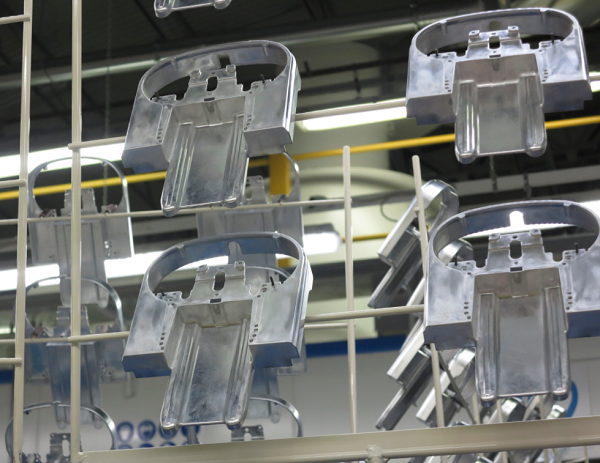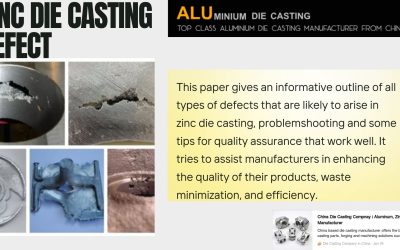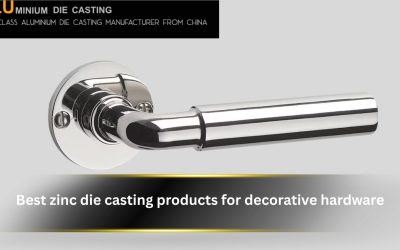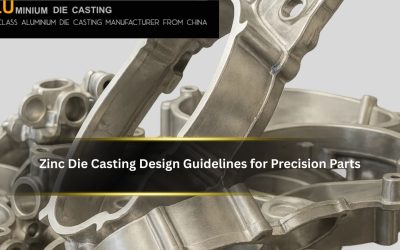Kovová slitina zinku se používá v mnoha výrobcích, které vidíme nebo používáme každý den. Je oblíbená, protože je pevná, cenově dostupná a snadno se tvaruje. Mnoho lidí se také ptá: Je kovová slitina zinku bezpečná? Ve většině případů je bezpečný pro každodenní použití, pokud je materiál kvalitní. Přesto je třeba neprodleně pochopit některé bezpečnostní obavy.
Zinková slitina je univerzální kov vhodný pro širokou škálu aplikací. Je lehká, snadno se tvaruje a je levná. Kovová slitina zinku je také stabilní při běžných teplotách. Neuvolňuje škodlivé látky. Když je však příliš vysoká, věci se nemusí dít podle očekávání.
Výkonnost zinkové slitiny závisí především na jejím složení a hustotě. Když jim všem porozumíte, můžete si vybrat správné výrobky ze slitiny zinku a s jistotou je používat. Dokážete rozlišit, který kov ze slitiny zinku je bezpečný a který byste měli ignorovat.
Tento článek se zabývá především výhodami a omezeními zinkových slitin. Zaměřuje se na bezpečnostní problémy spojené se slitinou zinku. Pojednává také o bezpečnostních opatřeních a některých alternativách, z nichž si můžete vybrat.
Co je kovová zinková slitina?
Kovová slitina zinku se obvykle vyrábí smícháním zinku s jinými kovy. Mezi běžně používané kovy patří hliník, měď a hořčík. Hlavním účelem přidání těchto kovů je zlepšení fyzikálních a chemických vlastností slitiny. Ve většině případů potřebujeme upravit pevnost, tvrdost a odolnost.
Kovová slitina zinku se hojně používá ve šperkařství, na výrobu odznaků, hraček, železářství a automobilových dílů. Obvykle se snadno tvaruje a vytváří hladké, detailní díly.
Nejdůležitějším faktorem, který je třeba vzít v úvahu, je hustota zinkové slitiny. Jak víte, různé slitiny mají přirozeně různou hustotu. Jejich poměr také ovlivňuje hmotnost, pevnost a pocit výsledného výrobku v ruce. Například slitiny ZAMAK mají velmi stabilní hustotu. Je to preferovaná volba pro tlakové lití projekty.
Lidé se často ptají: “Je slitina zinku bezpečná?”. Odpověď obvykle závisí na kvalitě slitiny a způsobu jejího použití.
Čistá kovová slitina zinku je obecně bezpečná a stabilní. Problémy nastávají pouze v případě, že nekvalitní slitiny obsahují nikl, kadmium nebo olovo. Certifikované slitiny zinku jsou bezpečné pro většinu výrobků, které přicházejí do styku s pokožkou.
Běžné typy zinkových slitin
Kovová slitina zinku se obvykle vyrábí v mnoha typech a třídách. Dvě nejběžnější skupiny však tvoří řada ZAMAK a řada ZA. Tyto slitiny se obvykle vyrábějí smícháním zinku s hliníkem, mědí a někdy i hořčíkem.
Výroba těchto slitin obvykle zahrnuje tavení zinku, přidávání dalších kovů a odlévání směsi do přesných tvarů. Cílem je zlepšit pevnost, pružnost a povrchovou úpravu.
Řada ZAMAK
Slitiny ZAMAK se hojně používají v oblasti tlakového lití. Obvykle se snadno taví a velmi dobře plní formy. Můžete je použít k výrobě odznaků, zámků, klik, hraček a malých strojních součástí. Slitiny ZAMAK mají stabilní hustotu zinkové slitiny. Tyto speciální vlastnosti jsou nezbytné pro pevný a vyvážený pocit. Jsou známé dobrou pevností, hladkým povrchem a nízkými výrobními náklady.
Řada ZA
Řada ZA zahrnuje ZA-8, ZA-12 a ZA-27. Tyto slitiny obsahují více hliníku. Díky tomu jsou skupiny ZA mnohem pevnější a tvrdší než standardní ZAMAK.
Slitiny ZA můžete použít pro širokou škálu těžkých dílů. Můžete z nich vyrábět ozubená kola, držáky, pouzdra a mnoho průmyslových součástí. Nabízejí vyšší pevnost, lepší odolnost proti opotřebení a dobré odlévací vlastnosti.
Hustota zinkových slitin výrobků ZA se mírně liší podle obsahu hliníku. Různé hustoty ovlivňují hmotnost a trvanlivost.
Výhody zinkových slitin
Než odpovíme na otázku “Je zinková slitina bezpečná?”, zjistíme některé z nejčastějších výhod zinkové slitiny. Slitina zinku nabízí mnoho výhod pro výrobu. Je pevná, cenově dostupná a snadno se tvaruje. Mnoho průmyslových odvětví, jako je například výroba hliníkových odlitků, dává přednost zinkovým slitinám pro vysoce kvalitní výrobky.
Nákladová efektivita
Jednou z nejlepších výhod použití kovové slitiny zinku je její cenová výhodnost. Její výroba je cenově dostupnější. Taví se při nízké teplotě, což snižuje náklady na energii. Snadno také plní formy, takže při výrobě dílů ze slitiny zinku můžete ušetřit čas i materiál. Z tohoto důvodu jsou díly ze slitiny zinku mnohem levnější než mnohé jiné kovové díly.
Udržitelnost
Slitiny zinku také podporují udržitelnou výrobu. Jsou široce dostupné a snadno recyklovatelné. Při výrobě kovových dílů ze zinkových slitin vzniká určitý odpad. Tyto dodatečné materiály lze recyklovat a znovu použít. Výrobní proces obecně spotřebovává méně energie než proces výroby jiných kovů. To vše ukazuje, že kovy ze slitin zinku jsou udržitelné.
Všestrannost aplikací
Kovové slitiny zinku se snadno tvarují a lze je použít v mnoha průmyslových odvětvích. Skvěle se hodí na výrobu šperků, železářského zboží, hraček, elektroniky a automobilových dílů. Hodí se také pro malé i velké součásti.
Jak víte, kovové slitiny zinku můžete tvarovat do detailních forem; můžete vyrobit doslova cokoli chcete. Otevírá se tak široká škála možností pro kreativní tvorbu. Díky této všestrannosti jsou slitiny zinku obvykle ideální pro širokou škálu použití.
Snadná práce
Zinková slitina se rychle taví a hladce vtéká do forem. Díky tomu je tato slitina ideální pro tlakové lití a další projekty tváření kovů. Vytváří ostré detaily, tenké stěny a čisté povrchy.
Kovová slitina zinku se také rychle ochlazuje, takže výrobní rychlost je obecně vysoká. Tento kov také produkuje méně vad a celkově zjednodušuje celý proces odlévání.
Recyklovatelnost
Kovová slitina zinku je plně recyklovatelná. Můžete jej roztavit, recyklovat a znovu použít bez ztráty kvality. V továrně často sbíráme šrotové díly a vyrábíme z nich nové výrobky.
Recyklace zinkových slitin obvykle snižuje množství odpadu a snižuje výrobní náklady. Recyklace kovových slitin zinku tak snižuje množství odpadu a snižuje výrobní náklady. Z tohoto důvodu je kovová slitina zinku odpovědnou volbou pro společnosti, kterým záleží na udržitelnosti.
Odolnost proti korozi
Slitiny zinku jsou přirozeně odolné proti korozi. Obvykle vytvářejí ochrannou vrstvu, která zpomaluje vznik koroze a oxidace. Z tohoto důvodu jsou kovové díly ze zinkových slitin ideální pro venkovní výrobky nebo předměty vystavené vlhkosti. I bez pokovení zůstávají kovové slitiny zinku dlouho pevné. Pokud použijete povrchové nátěry, odolnost proti korozi se ještě zvýší.
Pevnost a odolnost
Přestože jsou kovy ze zinkových slitin lehké, mají také silné mechanické vlastnosti. Tyto kovové díly také odolávají nárazům, opotřebení a deformaci. Různé úrovně hustoty zinkových slitin zvyšují stabilitu a pevnost.
Mnoho dílů ze zinkové slitiny vydrží dlouhá léta, a to i při každodenním používání. Díky tomu můžete tento kov použít pro širokou škálu aplikací v různých průmyslových odvětvích.
Je zinková slitina bezpečná?
Slitina zinku se široce používá v mnoha výrobcích. Je totiž pevná, stabilní a snadno se tvaruje. Je však slitina zinku bezpečná? Je skutečně prospěšná pro vaše zdraví? Co se stane při dlouhodobém používání?
Odpověď závisí na tom, jak je materiál vyroben a jak se používá. Obecně jsou slitiny zinku považovány za bezpečné pro většinu aplikací. Existují však situace, kdy se mohou objevit bezpečnostní problémy.
Posouzení obecné bezpečnosti
Kovová slitina zinku je obvykle bezpečný a vyrábí se ze zinku ve směsi s jinými kovy. V tomto případě se běžně používá hliník, hořčík a měď. Tyto kovy jsou stabilní a při každodenním používání neuvolňují škodlivé látky. Slitina zinku má stálou hustotu, což znamená, že se snadno nerozbije.
Většina slitin zinku se používá v železářství, elektronice, automobilových dílech a dekoracích. Tyto aplikace obvykle nepředstavují bezpečnostní riziko. Moderní slitiny zinku se obvykle vyrábějí v souladu s přísnými normami. Ve společnosti aludiecast materiály pečlivě testujeme a dbáme na to, aby byly bezpečné a čisté. Při správné výrobě je slitina zinku netoxická a bezpečná pro každodenní použití.
Situace, kdy slitina zinku NENÍ bezpečná
Přestože je kovová slitina zinku obecně bezpečná, existují případy, kdy nemusí být ideální. Tyto obavy o bezpečnost vznikají v důsledku nekvalitní výroby nebo nesprávného použití.
Skrytý obsah niklu
Některé výrobky ze slitin zinku mohou obsahovat nikl. Lidé ho obvykle používají ke zvýšení tvrdosti nebo lesku. Mějte však na paměti, že nikl může u některých lidí vyvolat kožní alergie. Pokud jste na nikl citliví, může přímý kontakt s pokožkou způsobit její podráždění.
Kvalitní zinkové slitiny nikl nepoužívají nebo jej používají v bezpečných mezích. Nekvalitní výrobky však tato pravidla dodržovat nemusí. Proto si před nákupem šperků nebo nositelných předmětů zkontrolujte informace o materiálu.
Kontaminace olovem v nekvalitních slitinách
Olovo je nebezpečnější. Ve směsi se slitinou zinku může představovat různá zdravotní rizika. Olovo skutečně napomáhá snadnému tavení slitiny a je také mnohem levnější. Některé nekvalitní továrny obvykle přidávají olovo, aby snížily náklady. Přidáním olova se výrobek obvykle stává nebezpečným. Kromě toho může olovo způsobit vážné zdravotní problémy, zejména u dětí.
Vysoce kvalitní zinková slitina splňuje přísné bezolovnaté normy. Ve společnosti Aludiecast testujeme čistotu každého kovového dílu ze slitiny zinku. Chcete-li zůstat v bezpečí, snažte se vyhnout extrémně levným předmětům ze slitiny zinku. Vždy používejte důvěryhodné dodavatele, kteří zaručují bezolovnatou výrobu.
Zahřívání nebo tavení zinkové slitiny
Kovová slitina zinku by se neměla přehřívat. Při vysokých teplotách zinek produkuje výpary. Tyto výpary jsou velmi nebezpečné pro dýchání. K tomuto problému dochází pouze při tavení nebo svařování.
Při běžném denním používání se tato teplota obvykle nedosahuje. Pokud však pracujete při odlévání nebo opravách kovů, nezapomeňte na bezpečnostní opatření. Vždy používejte větrání a ochranné nástroje. Vyvarujte se dýchání zinkových výparů, protože mohou způsobit “horečku z kovových výparů”.”
Nevhodné pro výrobky určené pro styk s potravinami
Kovová slitina zinku není bezpečná pro přímé použití v potravinách. Neměla by se používat na hrnky, talíře nebo nástroje, které přicházejí do styku s potravinami. Potravinové kyseliny mohou se zinkem reagovat a uvolňovat částice do potravin. Z tohoto důvodu se kovové díly ze slitiny zinku nepoužívají pro kuchyňské náčiní nebo nádoby na vodu.
Nenechte se zmást! Nepoužívání zinkové slitiny pro nádoby na potraviny neznamená, že je toxická. Znamená to pouze, že není vhodná pro výrobky související s potravinami. Z důvodu bezpečnosti vždy volte nerezovou ocel nebo certifikované materiály vhodné pro potraviny.
Bezpečnost pro každodenní použití spotřebitelem
Pro výrobky každodenní potřeby se široce používá kovová slitina zinku, která je obecně bezpečná. Při výrobě spotřebních dílů je třeba dbát pouze na jejich kvalitu. Zajistěte, aby nebyl použit nikl, olovo nebo nebezpečná kovová slitina. Dobré továrny, jako je Aludiecast, vyrábějí slitiny se stabilní hustotou zinkové slitiny a bezpečným složením kovu.
Bezpečné aplikace
Kovová slitina zinku je považována za bezpečnou pro mnoho běžných předmětů. Jako příklad si můžete uvést kliky dveří, automobilové díly, elektronické kryty, přezky a zipy. Kromě toho jej můžete použít na mnoho domácích dekorací, nářadí a drobných mechanických dílů. Tyto výrobky obvykle nepředstavují žádné zdravotní riziko. Nepřicházejí do styku s potravinami ani nedosahují vysokých teplot.
Díky hustotě zinkové slitiny jsou materiály pevné a mají dlouhou životnost. Pro tato použití obvykle nehrozí žádné nebezpečí. Odpověď na otázku “Je kovová slitina zinku bezpečná?” je tedy pro většinu aplikací každodenního použití ano.
Kontakt s kůží
Kvalitní kovová slitina zinku je obvykle bezpečná pro pokožku. Ve skutečnosti nerezaví a nezanechává skvrny na kůži. Pokud však slitina zinku obsahuje nikl nebo kadmium, vyvolává to několik bezpečnostních obav, zejména pokud jde o kontakt s pokožkou.
Některé šperky ze slitiny zinku obsahují nikl, který může u některých lidí vyvolávat alergie. Pokud vaše pokožka reaguje na nikl, vyhněte se levným šperkům ze slitiny zinku. Snažte se vybírat šperky bez obsahu niklu a vyhněte se levným šperkům ze slitiny zinku. Všimněte si, že u kvalitních slitin je jasně uvedeno jejich složení.
Bezpečnost pro děti
Kvalitní kovová slitina zinku je bezpečná i pro děti. Na hračky, zipy, knoflíky a doplňky se vždy používají slitiny bez obsahu olova a niklu. Drobné nekvalitní předměty však mohou obsahovat olovo, které nemusí být pro děti zdravé. Mohly by si ho dát do úst, což zvyšuje riziko. Při výběru dílů ze slitiny zinku je tedy třeba zkontrolovat materiálové složení hraček. Používejte bezpečné, certifikované výrobky, které splňují bezpečnostní normy.
Bezpečnostní problémy zinkové slitiny
Kovová slitina zinku je obecně bezpečná. Některé slitiny však obsahují nikl, kadmium nebo olovo. Tyto kovy mohou způsobit akutní zdravotní účinky, včetně horečky z kovových výparů a alergií. Pojďme se o těchto zdravotních problémech dozvědět více, abychom lépe porozuměli bezpečnostním problémům spojeným se slitinami zinku.
Akutní zdravotní účinky kovové slitiny zinku
Akutní problémy, jako je podráždění kůže nebo očí, jsou poměrně časté. K podráždění kůže může dojít, pokud kovová slitina zinku obsahuje nikl. K podráždění očí může dojít při manipulaci s ostrými nebo neleštěnými díly. Lidé s citlivostí na kovy mohou reagovat rychle. Tyto reakce nejsou způsobeny samotným zinkem. Příčinou jsou nebezpečné hladiny přidaných kovů v nekvalitních slitinách.
Horečka z kovových výparů ze zinkové slitiny
Horečka z kovového dýmu obvykle vzniká při zahřívání, svařování nebo tavení zinkové slitiny. Při vysokém žáru vznikají výpary oxidu zinečnatého. Pokud je vdechnete, mohou způsobit horečku, bolest hlavy nebo kašel. Tyto typy problémů se často objevují u pracovníků ve výrobě. Proto je vždy nutné používat osobní ochranné pomůcky a zajistit správné větrání.
Chronické zdravotní účinky kovové slitiny zinku
Chronické zdravotní problémy se obvykle vyvíjejí v průběhu času. Nikl v kovové slitině zinku může způsobit dlouhodobé kožní problémy. Na druhé straně kadmium může způsobit toxicitu, poškození ledvin a další závažné problémy.
Olovo může způsobit chronickou otravu, zejména pokud slitina není v souladu s RoHS. Expozice olovu může poškodit nervový systém a samozřejmě není bezpečná pro děti.
Alergie a citlivost na kovy ze slitiny zinku
Přítomnost niklu, kadmia nebo olova může ve vašem těle rovněž vyvolat alergie. I když se to stává pouze těm, kteří jsou na ně citliví. Mezi nejčastější příznaky patří zarudnutí, svědění a vyrážka.
Klíčová bezpečnostní opatření při používání kovové slitiny zinku
Je slitina zinku bezpečná? Obecně je bezpečný. Správné zacházení však může bezpečnost zvýšit. Tato opatření pomohou vám i pracovníkům před zdravotními problémy. Tato opatření lze uplatnit jak v továrnách, tak u běžných uživatelů.
Používejte osobní ochranné prostředky (OOP)
Osobní ochranné pracovní prostředky jsou povinnou součástí vybavení zaměstnanců pracujících v továrně. Obvykle je chrání před prachem, výpary a ostrými hranami. Rukavice obvykle zabraňují podráždění kůže, zatímco brýle chrání oči. Masky výrazně omezují vdechování zinkového prachu. Při řezání, broušení nebo leštění kovů ze zinkových slitin doporučujeme používat osobní ochranné pomůcky. Udrží vás v bezpečí a sníží mnohá zdravotní rizika.
Zajistěte správné větrání
V továrnách je také důležité dobré větrání. Obvykle odstraňuje výpary vznikající při zahřívání nebo tavení kovové zinkové slitiny. Čerstvý vzduch obvykle snižuje pravděpodobnost vzniku horečky z kovových výparů. Odsávací ventilátory a vzduchové filtry vám pomohou udržet čistý vzduch. Větrání také chrání vás i vaše pracovníky při svařování, odlévání a leštění.
Vyberte si bezpečné výrobky ze zinkové slitiny
Vždy volte certifikovanou slitinu zinku, jak vždy doporučujeme. Snažte se vybírat výrobky bez niklu a olova, abyste se vyhnuli alergiím nebo kontaminaci. Kvalitní slitiny splňují bezpečnostní normy, jako je RoHS a REACH. Certifikované materiály jsou totiž bezpečnější pro děti a každodenní používání.
Opatrně zacházejte s kovem ze zinkové slitiny a skladujte jej
Z bezpečnostních opatření je zásadní správná manipulace s kovovou slitinou zinku a její správné skladování. Snažte se jej skladovat na chladném a suchém místě. Chraňte výrobek před vlhkostí, protože voda může urychlit oxidaci. Pro dlouhodobé skladování můžete také použít uzavřené sáčky nebo vzduchotěsné nádoby.
Do skladovací nádoby můžete také umístit silikagelové obaly, které pohlcují vlhkost. Kovovou zinkovou slitinu můžete také chránit před slunečním zářením a teplem. Snažte se jej neskladovat v blízkosti chemikálií nebo čisticích prostředků. Hotové díly zabalte do měkkého hadříku, aby nedošlo k poškrábání. Nakonec kov před uskladněním očistěte, abyste jej zbavili potu nebo nečistot.
Používejte správnou likvidaci a recyklaci
Kovová slitina zinku je plně recyklovatelná. Nevyhazujte jej do běžného odpadu. Odevzdejte jej do certifikovaných sběren kovů. Tímto způsobem zabráníte znečištění životního prostředí a snížíte množství odpadu z těžkých kovů. Recyklace obvykle šetří energii a zdroje. Správná likvidace také podporuje ekologickou výrobu a bezpečné nakládání s kovem.
Jaké alternativy můžete zvolit?
Existuje několik bezpečných alternativ slitiny zinku. Tyto možnosti jsou obvykle užitečné, pokud máte obavy z alergií nebo pro použití, které vyžaduje vyšší pevnost. Každý materiál má své jedinečné výhody a omezení. Musíte pečlivě vybrat ten správný. Možná budete muset zvážit faktory, jako jsou potřeby vašeho projektu, rozpočet a bezpečnostní požadavky.
Nerezová ocel
Nerezová ocel by mohla být mnohem bezpečnější než zinkové slitiny. Nedochází k jejímu dehtování a je velmi pevná a trvanlivá. SS316 je speciálně vyrobena pro kuchyňské spotřebiče. Některé SS se však dobře hodí na šperky, přezky, nářadí a výrobky denní potřeby. Je také vysoce odolný vůči korozi, vodě a chemikáliím. Můžete si ji vybrat pro maximální odolnost.
Bezniklové slitiny zinku
Bezniklové zinkové slitiny jsou také bezpečnější alternativou zinkových slitin. Snižují riziko podráždění pokožky. Tyto slitiny stále poskytují dobrou pevnost, nízkou cenu a snadné odlévání. Jsou ideální pro výrobu odznaků, hraček, doplňků a módního kování.
Bezolovnaté slitiny zinku
Bezolovnaté slitiny zinku splňují bezpečnostní normy, jako je RoHS a REACH. Odstraňují riziko expozice olovu. Jsou bezpečné pro dětské předměty, řemeslné výrobky a spotřební zboží. Nabízejí stejné výhody jako běžné kovové slitiny zinku bez zdravotních rizik.
Titan, mosaz, hliník
Titan je velmi pevný a hypoalergenní. Mosaz nabízí klasický vzhled, ale může se dehtovat. Hliník je lehký a odolný proti korozi. Tyto materiály poskytují další možnosti bezpečného a spolehlivého používání.
Závěrečný verdikt: Je zinková slitina bezpečná?
Je slitina zinku bezpečná? Ano, obecně je bezpečný pro každodenní použití. Většina výrobky ze slitiny zinku jsou netoxické a stabilní. Jsou ideální volbou pro odznaky, šperky, spony, hračky a doplňky. Vysoce kvalitní kovová slitina zinku dodržuje bezpečnostní normy a neobsahuje škodlivé prvky. Díky tomu jsou tyto výrobky bezpečnější i pro děti.
Kovová slitina zinku však není v některých situacích bezpečná. Může být nebezpečná, pokud obsahuje nikl, protože nikl může způsobovat alergie. Může být nebezpečný, pokud obsahuje olovo, protože olovo je toxické. Nekvalitní slitiny mohou tyto kovy skrývat. Při zahřívání nebo svařování kovové zinkové slitiny také vznikají výpary. Tyto výpary mohou v továrnách způsobit horečku z kovových výparů. Kovová slitina zinku také není vhodná pro výrobky přicházející do styku s potravinami.
Proto je důležité pečlivě vybrat správný typ zinkové slitiny. Bezniklové a bezolovnaté kovové díly ze slitiny zinku jsou bezpečnější. V tomto případě je třeba věnovat pozornost hustotě a složení slitiny. Kromě toho může bezpečnost zvýšit i správná manipulace a skladování.
Pokud máte jakékoli dotazy, neváhejte se obrátit na náš tým zákaznické podpory. Ve společnosti Aludiecast nabízíme širokou škálu služeb v oblasti odlévání kovů. Jednou z našich hlavních služeb je výroba a montáž kovových dílů ze zinkových slitin.
Možná hledáte standardní řešení nebo řešení na míru. Ať tak či onak, náš tým dokáže splnit vaše projektové potřeby. Kontaktujte nás další informace.








0 komentáøù